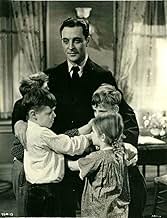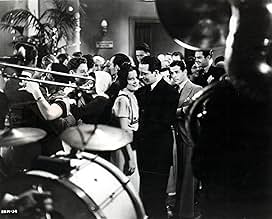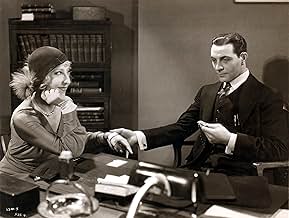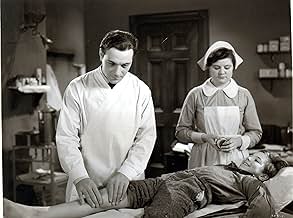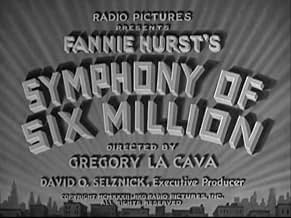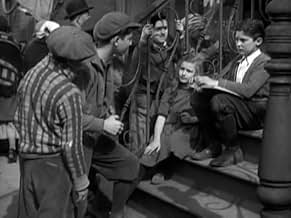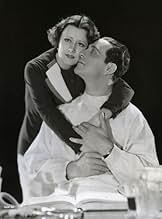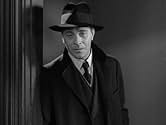NOTE IMDb
6,1/10
476
MA NOTE
Ajouter une intrigue dans votre langueA boy grows up to become a successful doctor at the expense of family relationships.A boy grows up to become a successful doctor at the expense of family relationships.A boy grows up to become a successful doctor at the expense of family relationships.
- Réalisation
- Scénario
- Casting principal
- Récompenses
- 2 victoires au total
Maurice Black
- Felix's Patient
- (non crédité)
Jesse De Vorska
- Mr. Horowitz - Hospital Patient
- (non crédité)
Harold Goodwin
- Intern at Hospital
- (non crédité)
Dorothy Gray
- Jessica - as a Girl
- (non crédité)
Julia Griffith
- Guest at Redemption Ceremony
- (non crédité)
Harry Holman
- Mr. Holman - Hospital Patient
- (non crédité)
Avis à la une
(There may be some Spoilers) Growing up in the Jewish ghetto on the lower East Side of Manhattan Felix Kauber, Ricardo Cortez, always wanted to help those less fortunate them himself which drove him to go into medical school and become a doctor. Working at the lower East Side Cherry Street Clinic Felix was happy helping the people in the area who couldn't afford to pay a family doctor or wait hours on end at the local hospital emergency ward for treatment which was no where up to the high standards that Felix provided for them free of charge.
Happy with his lot in life Felix's life begins to change for the worse when his greedy younger brother Magnus,Noal Maison, persuades their mom Mrs. Hanna Klauber, Anna Appal, to somewhat reluctantly tell Felix that he was throwing away his future as a high paid Park Avenue doctor, treating neurotic but very rich society women, by giving his service to people who were more or less charity cases.
It takes a while for Felix to change his lifestyle and doctors office, from downtrodden Cherry Street to rich and swanky Park Avenue, feeling rightly at first that his roots and friends that needed him most were in that poor to middle-class community. Finally taking his mom's and brothers advice Felix moves up in the world of medicine, and list of high class patients, becoming one of the foremost and respected surgeons in New York. But what he doesn't know until it's almost too late is that he traded in his humanity as well as his soul for a pot of porridge; like Esau the twin brother of Jacob traded his birthright in the bible.
Very effective and ahead of it's time early talkie about a Jewish family without the usual racial and ethnic stereotype. We even have Felix have a girlfriend the sweet and caring braille teacher Jessica, Irene Dunne, who seems to be non-Jewish, Jessica looks and acts like she's Irish, with his very Jewish parents not making a point of it which you would have expected in a very Jewish movie like "Symphony for Six Million".
Felix's father Mayer, Gregory Ratoff, as well as his mother Hanna and girlfriend Jessica become more and more distant from Filex as he becomes part of the upper crust of high society without even him realizing. When Felix wasn't able to attend to young Georgie, a boy from then ghetto, who died on the operating table that Felix finally realized that eh had gone astray; Georgie died with the words Felix on his lips. Felix got the news of Georgie's death from Jessica whom he at first, until he realized that it was her, didn't want to see her at his office because she didn't have a doctor's appointment.
Felix trying to keep his past in the Lower East Side behind him has it catch up with Felix big-time when his father Meyer suffers a stroke at a party given by Fielx's sister and her husband as well as their new born son. Filex being the only one who could remove the deadly tumor from his fathers brain suddenly freezes-up and in the ensuing operation Mayer dies on the operating table. It has to be said that Felix did the best he, or any other brain surgeon, could have but still held himself responsible for his fathers Meyer Klauber's death.
Broken in both mind and body Felix mindlessly roams the streets of New York in a haze not knowing if he'll ever be able to hold a scalpel in his hands again and goes into a deep depression where he just about gave up any hope or future from himself. It's when Felix got the word that his girlfriend Jessica is to be operated on, for the removable a spine tumor, that the old Felix came back. The attending physician Dr. Schiffen,John S. Polis, feeling that Felix is a much better surgeon then he'll ever be allows Felix to operate on Jessica. A bit rusty and out of form Felix never the less ends up saving Jessica in a miraculous spine operation thus saving both her life and redeeming his soul and his lifelong concern for the city's underprivileged.
Nowhere as corny as you would expect it to be with a solid performance by Ricardo Cortez, who's Jewish himself, as the humble and caring Jewish doctor Felix Klauber. Felix learned in the end what he always believed, until he was corrupted by a fistful of shekels. Felix learned that being a physician and surgeon is to live by the rule that he always had deeply etched in both his heart and soul and upheld until greed and high society momentary blinded him of it: "I dedicate these two hands..That the lame may walk, the halt be strong..Lifting up the needy; comforting the dying. This is my oath in the Temple of Healing".
Happy with his lot in life Felix's life begins to change for the worse when his greedy younger brother Magnus,Noal Maison, persuades their mom Mrs. Hanna Klauber, Anna Appal, to somewhat reluctantly tell Felix that he was throwing away his future as a high paid Park Avenue doctor, treating neurotic but very rich society women, by giving his service to people who were more or less charity cases.
It takes a while for Felix to change his lifestyle and doctors office, from downtrodden Cherry Street to rich and swanky Park Avenue, feeling rightly at first that his roots and friends that needed him most were in that poor to middle-class community. Finally taking his mom's and brothers advice Felix moves up in the world of medicine, and list of high class patients, becoming one of the foremost and respected surgeons in New York. But what he doesn't know until it's almost too late is that he traded in his humanity as well as his soul for a pot of porridge; like Esau the twin brother of Jacob traded his birthright in the bible.
Very effective and ahead of it's time early talkie about a Jewish family without the usual racial and ethnic stereotype. We even have Felix have a girlfriend the sweet and caring braille teacher Jessica, Irene Dunne, who seems to be non-Jewish, Jessica looks and acts like she's Irish, with his very Jewish parents not making a point of it which you would have expected in a very Jewish movie like "Symphony for Six Million".
Felix's father Mayer, Gregory Ratoff, as well as his mother Hanna and girlfriend Jessica become more and more distant from Filex as he becomes part of the upper crust of high society without even him realizing. When Felix wasn't able to attend to young Georgie, a boy from then ghetto, who died on the operating table that Felix finally realized that eh had gone astray; Georgie died with the words Felix on his lips. Felix got the news of Georgie's death from Jessica whom he at first, until he realized that it was her, didn't want to see her at his office because she didn't have a doctor's appointment.
Felix trying to keep his past in the Lower East Side behind him has it catch up with Felix big-time when his father Meyer suffers a stroke at a party given by Fielx's sister and her husband as well as their new born son. Filex being the only one who could remove the deadly tumor from his fathers brain suddenly freezes-up and in the ensuing operation Mayer dies on the operating table. It has to be said that Felix did the best he, or any other brain surgeon, could have but still held himself responsible for his fathers Meyer Klauber's death.
Broken in both mind and body Felix mindlessly roams the streets of New York in a haze not knowing if he'll ever be able to hold a scalpel in his hands again and goes into a deep depression where he just about gave up any hope or future from himself. It's when Felix got the word that his girlfriend Jessica is to be operated on, for the removable a spine tumor, that the old Felix came back. The attending physician Dr. Schiffen,John S. Polis, feeling that Felix is a much better surgeon then he'll ever be allows Felix to operate on Jessica. A bit rusty and out of form Felix never the less ends up saving Jessica in a miraculous spine operation thus saving both her life and redeeming his soul and his lifelong concern for the city's underprivileged.
Nowhere as corny as you would expect it to be with a solid performance by Ricardo Cortez, who's Jewish himself, as the humble and caring Jewish doctor Felix Klauber. Felix learned in the end what he always believed, until he was corrupted by a fistful of shekels. Felix learned that being a physician and surgeon is to live by the rule that he always had deeply etched in both his heart and soul and upheld until greed and high society momentary blinded him of it: "I dedicate these two hands..That the lame may walk, the halt be strong..Lifting up the needy; comforting the dying. This is my oath in the Temple of Healing".
I was intrigued with the title of Six Million having a Jewish theme and what the connection would be since the movie was made in 1932. Once watching I was riveted to the story. The actors were custom made for their parts, hearing Oyfn Pripinchik being played throughout the movie made it heartwarming and endearing. A real Yiddishe Mama, an old fashioned papa (fabric cutter) and their children all living on the Lower East Side. The theme was that one of their son's wanted to be a doctor and took up a practice in their neighborhood caring for the poor (sometimes accepting no payment or very little) because it was rewarding for him. His brother saw it as wasting his talents and wanted him to become a Park Avenue big shot to make money. He did and lost his spirit. But wait til the middle and the end to see what happens. Have a box of tissues around. You will need it. Typical Fanny Hurst style.
A previous viewer commented that there isn't anything "Pre-Code" about "Symphony of Six Million." Ohhhh, yes there is - the frank and loving embrace of Jews and Jewishness, especially the familial bonds of aspiration, hope and love so strong and heart-rending that conflict and guilt are its inevitable by-products.
Such an overtly Jewish photo play wouldn't have been acceptable in the Hollywood of just a few years later. No one would come right out and say so, but the likely reason was the sensibilities of the newly militant Catholic audience, then being stirred up by the likes of Father Charles Coughlin's anti-Semitic radio talks. Also to be catered to were the quieter prejudices of Middle Western Protestants, for whom Will Hays stood in as proxy on the Code committee.
The story being pretty boilerplate, the charm of this film is all in the atmosphere, which is laid on pretty thickly. Crucial to this are able supporting players, especially Gregory Ratoff and Anna Appel as Papa and Mama Klauber. Ricardo Cortez is a bit stiff as the conflicted, noble Felix, but his swarthy, polished earnestness hits just the right note for the well-to-do My-Son-The-Park-Avenue-Doctor, 1932 edition. Irene Dunne as Jessica, Felix's crippled love interest, is lovable mostly for being Irene Dunne, whose refined features and diction don't gibe at all with her role as a ghetto girl. It says a lot about the men who once ran the movies that an obviously Jewish romantic female lead was something they couldn't, or wouldn't, portray. Authentic Jewish womanhood was still inseparable from the family matriarch, played with affecting melodrama by Appel.
TCM's Robert Osborne pointed out that "Symphony" was one of the first talkies with a full original score. At David Selznick's behest, Max Steiner wrote nearly continuous music for the film. It's heavy going at times: Felix's inner drama is too often greeted by heroic heralds of brass, and the lugubrious harmonic-minor strings accompanying Irene Dunne's entrances are like a nice glass Schmalz poured over a sumptuous Sunday chicken dinner.
Such an overtly Jewish photo play wouldn't have been acceptable in the Hollywood of just a few years later. No one would come right out and say so, but the likely reason was the sensibilities of the newly militant Catholic audience, then being stirred up by the likes of Father Charles Coughlin's anti-Semitic radio talks. Also to be catered to were the quieter prejudices of Middle Western Protestants, for whom Will Hays stood in as proxy on the Code committee.
The story being pretty boilerplate, the charm of this film is all in the atmosphere, which is laid on pretty thickly. Crucial to this are able supporting players, especially Gregory Ratoff and Anna Appel as Papa and Mama Klauber. Ricardo Cortez is a bit stiff as the conflicted, noble Felix, but his swarthy, polished earnestness hits just the right note for the well-to-do My-Son-The-Park-Avenue-Doctor, 1932 edition. Irene Dunne as Jessica, Felix's crippled love interest, is lovable mostly for being Irene Dunne, whose refined features and diction don't gibe at all with her role as a ghetto girl. It says a lot about the men who once ran the movies that an obviously Jewish romantic female lead was something they couldn't, or wouldn't, portray. Authentic Jewish womanhood was still inseparable from the family matriarch, played with affecting melodrama by Appel.
TCM's Robert Osborne pointed out that "Symphony" was one of the first talkies with a full original score. At David Selznick's behest, Max Steiner wrote nearly continuous music for the film. It's heavy going at times: Felix's inner drama is too often greeted by heroic heralds of brass, and the lugubrious harmonic-minor strings accompanying Irene Dunne's entrances are like a nice glass Schmalz poured over a sumptuous Sunday chicken dinner.
... and Dr. Felix Klauber (Ricardo Cortez as the adult Felix) always seems to have the best intentions. The movie starts out showing Felix as a child studying on the doorstep of his family's ghetto tenement house, taking time to defend a local girl with a curved spine (Irene Dunne as Jessica) from some taunting street bullies. The movie spends a good deal of time focusing on Felix' home environment as a child. We learn that his parents are immigrant Jews, that his father has a kind heart but a bit of a temper, that his brother can be a trouble maker but only in the way that most boys can be, and that his mother is everything you'd want a mom to be. In other words, Felix lives surrounded by misery and poverty, but his own family is doing alright and he has a very good home. Felix is very thoughtful and decides the best way he can alleviate the misery of the poor is to become a doctor and treat everyone, regardless of ability to pay.
Unlike most childhood dreams, Felix works hard and makes his a reality. As a doctor he treats people both at his home - he still lives in the ghetto with his family - and at a local clinic set up for such work. Everybody is happy - except Felix' brother Magnus. Magnus has become a businessman, thinks everything should be for sale, and that includes medicine. He's unhappy that Felix still lives with his parents in the ghetto when he could set up a nice practice in the wealthier part of the city. Knowing his brother could care less what he thinks, he convinces their mother to beg Felix to go uptown based on the fact that their father is getting old and needs to retire. It works.
The next thing we see is Felix treating socialite women whose only problem is that they are bored and overweight, although he does get paid handsomely for it. Now everyone in the Klauber household is again happy - except Felix who realizes his talents are being wasted but just can't seem to break away from the ties that bind him to his new existence. He no longer even has time to spend with the family he did all of this for in the first place. How will all of this come out? I'll let you watch and find out.
The ending was a bit too melodramatic, but overall it was a pretty satisfying film. Another reviewer mentioned the one unusual precode element of this film - the detailed portrayal of a Jewish religious ceremony being performed towards the end of the film on Birdie's new born baby - Birdie was Felix' sister. The production code which began being enforced in 1934 only allowed Christian rituals to be shown. Another unusual element of the film - Jessica as Felix' love interest although she has a noticeably curved spine. Jessica teaches blind children and acts as Felix' link to his past and his once virtuous goals. It's almost like in the cartoons when you see a character with an angel on one shoulder whispering in one ear and a devil in the other. Jessica plays the part of the angel here, Magnus is the devil - however he's a smart enough devil to always send his mother as his mouthpiece. Who would say no to mom?
Unlike most childhood dreams, Felix works hard and makes his a reality. As a doctor he treats people both at his home - he still lives in the ghetto with his family - and at a local clinic set up for such work. Everybody is happy - except Felix' brother Magnus. Magnus has become a businessman, thinks everything should be for sale, and that includes medicine. He's unhappy that Felix still lives with his parents in the ghetto when he could set up a nice practice in the wealthier part of the city. Knowing his brother could care less what he thinks, he convinces their mother to beg Felix to go uptown based on the fact that their father is getting old and needs to retire. It works.
The next thing we see is Felix treating socialite women whose only problem is that they are bored and overweight, although he does get paid handsomely for it. Now everyone in the Klauber household is again happy - except Felix who realizes his talents are being wasted but just can't seem to break away from the ties that bind him to his new existence. He no longer even has time to spend with the family he did all of this for in the first place. How will all of this come out? I'll let you watch and find out.
The ending was a bit too melodramatic, but overall it was a pretty satisfying film. Another reviewer mentioned the one unusual precode element of this film - the detailed portrayal of a Jewish religious ceremony being performed towards the end of the film on Birdie's new born baby - Birdie was Felix' sister. The production code which began being enforced in 1934 only allowed Christian rituals to be shown. Another unusual element of the film - Jessica as Felix' love interest although she has a noticeably curved spine. Jessica teaches blind children and acts as Felix' link to his past and his once virtuous goals. It's almost like in the cartoons when you see a character with an angel on one shoulder whispering in one ear and a devil in the other. Jessica plays the part of the angel here, Magnus is the devil - however he's a smart enough devil to always send his mother as his mouthpiece. Who would say no to mom?
Several people posting reviews for "Symphony of Six Million" have made some terrific points. One is that the title of this film, about Jews in New York, eerily suggests the Holocaust - well, that's why I watched it, in fact. I didn't read the description too clearly, saw the word Jewish, and I thought it was about Jews in Germany escaping to New York. The second comment was that it is a depiction of a Jewish family that several years later would not have been done in Hollywood for various reasons.
"Symphony of Six Million" stars Ricardo Cortez, Gregory Ratoff and Irene Dunne. It's the story of a young Jewish boy, Felix Klauber (Cortez) who grows up in the ghetto wanting to be a doctor who helps the people there. All is well until he is pressured by his brother Magnus (Noel Madison) to help the family get out of the ghetto so his father doesn't have to work so hard, his sister can marry well, etc., none of which he can do working for the poor. So Felix gives up his dream and moves to the upper West Side and then to Park Avenue, becoming more and more unhappy. Then there is a tragedy, and Felix is forced to re-look at his life.
The Fannie Hurst story is dated, melodramatic and is filled with stereotypical dialogue such as "you want I should" with a sing-songy voice throughout. Yet it shows the life of an immigrant in the ghetto that moves up and manages to hold interest, mainly because the family exhibits warmth, love, humor and charm. Gregory Ratoff is terrific as Mr. Klauber. Cortez, always an affable actor, has some of the heaviest dialogue, so at times his acting seems overdone. Noel Madison as Felix's brother has the right energy for his role and is a little reminiscent of the actor Phil Casnoff. As others have pointed out, Irene Dunne isn't low-class enough as Felix's crippled girlfriend, and one wonders throughout why she and Felix didn't get married. She is so pretty as a brunette, however, and has a lovely quality.
This is the first fully-orchestrated talkie, and the music is completely distracting with its weeping violin sounds. The other distracting thing is that characters speak off camera and it sounds as if the actors are being fed lines by a director's assistant - the sound has no presence at all as it isn't miked.
What makes this film especially dated is the idea of someone becoming a doctor to work in a clinic and help people and not care about money. This may have been the America of 1932; it sure isn't now. Well worth seeing.
"Symphony of Six Million" stars Ricardo Cortez, Gregory Ratoff and Irene Dunne. It's the story of a young Jewish boy, Felix Klauber (Cortez) who grows up in the ghetto wanting to be a doctor who helps the people there. All is well until he is pressured by his brother Magnus (Noel Madison) to help the family get out of the ghetto so his father doesn't have to work so hard, his sister can marry well, etc., none of which he can do working for the poor. So Felix gives up his dream and moves to the upper West Side and then to Park Avenue, becoming more and more unhappy. Then there is a tragedy, and Felix is forced to re-look at his life.
The Fannie Hurst story is dated, melodramatic and is filled with stereotypical dialogue such as "you want I should" with a sing-songy voice throughout. Yet it shows the life of an immigrant in the ghetto that moves up and manages to hold interest, mainly because the family exhibits warmth, love, humor and charm. Gregory Ratoff is terrific as Mr. Klauber. Cortez, always an affable actor, has some of the heaviest dialogue, so at times his acting seems overdone. Noel Madison as Felix's brother has the right energy for his role and is a little reminiscent of the actor Phil Casnoff. As others have pointed out, Irene Dunne isn't low-class enough as Felix's crippled girlfriend, and one wonders throughout why she and Felix didn't get married. She is so pretty as a brunette, however, and has a lovely quality.
This is the first fully-orchestrated talkie, and the music is completely distracting with its weeping violin sounds. The other distracting thing is that characters speak off camera and it sounds as if the actors are being fed lines by a director's assistant - the sound has no presence at all as it isn't miked.
What makes this film especially dated is the idea of someone becoming a doctor to work in a clinic and help people and not care about money. This may have been the America of 1932; it sure isn't now. Well worth seeing.
Le saviez-vous
- AnecdotesAfter David O. Selznick became RKO's head of production in late 1931, he put the melodrama L'âme du ghetto (1932) (originally titled "Night Bell" after the Fannie Hurst story it is based on) into production, overseen by Pandro S. Berman. Selznick insisted that the original screenplay be rewritten to reclaim the ethnic touches from Hurst's story. Selznick likely wanted the film to serve as a mirror on to Jewish life, both of immigrants and their assimilated children. He himself changed the name of the film (a reference to New York City's population) as it was "more dramatic and dignified" than Night Bell. He also directed RKO music department chief Max Steiner to use symphonic music for the score and to have music throughout the picture. This was innovative as "talkies" rarely had an extensive score.
- GaffesAs is often the case when showing a devout Jewish home, a menorah, the traditional candelabrum, is displayed. However, this is used only once a year, so for the rest of the year it is put away. Having it on show is like having a Christmas tree up all year round to show that the family are Christians.
- Citations
Dr. Schifflen: My boy, there are two kinds of men in our profession. Some are gifted with the spark of genius; some of us are... just doctors.
[walks to the door and opens it, then turns back toward Felix]
Dr. Schifflen: Felix Klauber, you're more capable than I, but if you don't go through with this operation, I will.
- ConnexionsFeatured in David O. Selznick: 'Your New Producer' (1935)
Meilleurs choix
Connectez-vous pour évaluer et suivre la liste de favoris afin de recevoir des recommandations personnalisées
Détails
- Date de sortie
- Pays d’origine
- Langues
- Aussi connu sous le nom de
- Symphony of Six Million
- Lieux de tournage
- Coney Island, Brooklyn, Ville de New York, New York, États-Unis(amusement park)
- Société de production
- Voir plus de crédits d'entreprise sur IMDbPro
Box-office
- Budget
- 270 000 $US (estimé)
- Durée
- 1h 34min(94 min)
- Couleur
- Rapport de forme
- 1.37 : 1
Contribuer à cette page
Suggérer une modification ou ajouter du contenu manquant

